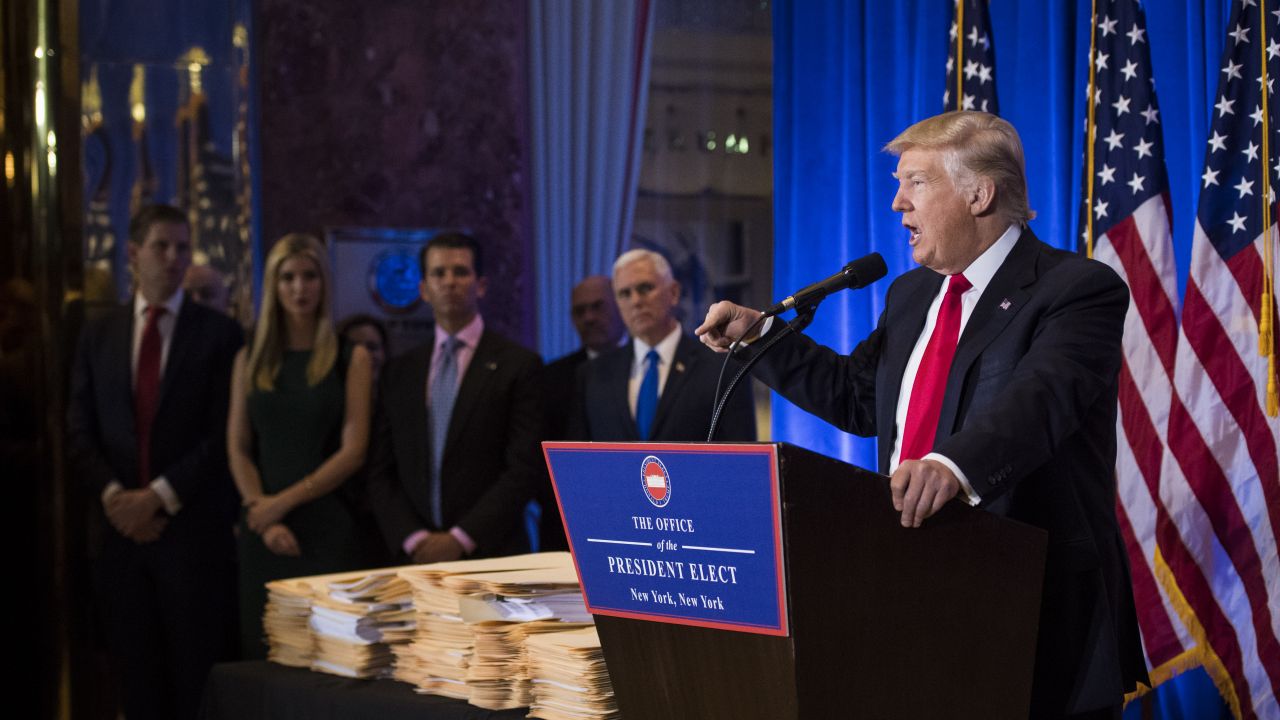
NEW YORK, NY - JANUARY 11: President-elect Donald Trump speaks during a press conference at Trump Tower in New York, NY on Wednesday, Jan. 11, 2017. (Photo by Jabin Botsford/The Washington Post via Getty Images)
This post originally appeared at Mother Jones.
From the moment Donald Trump removed his hand from his family Bible and officially became the 45th president on Jan. 20, he has been in violation of the law and the US Constitution. That’s the argument made by a number of watchdogs, business owners and Democratic members of Congress in a series of lawsuits targeting Trump’s global business empire.
No other president in the nation’s history entered office with a business portfolio anything like Trump’s sprawling web of hotels, restaurants, loans, real estate properties, branded merchandise, licensing agreements and more. And no president has done so little to separate himself from his private financial holdings — Trump has refused to liquidate his assets or place them in a blind trust, insisting, disingenuously, that “the president can’t have a conflict of interest.”
Others disagree. Trump faces four different lawsuits focusing on his businesses and the conflicts they pose to his presidency. Below, we explain each of the suits: what it’s about, who filed it and how Trump and his lawyers have responded. Confused about what an “emolument” is? Don’t know the cast of characters? Wondering what the goals are? We’ve got answers.
And we’ll update the status of each suit as it progresses. Check back for the latest action.
The Emoluments Lawsuits
Of the four lawsuits (so far), three of them focus on an obscure term that’s come into fashion since Trump’s election: emoluments. The framers of the Constitution used this word as a shorthand for gifts, honorary titles and offices and other perks that could create undue influence and lead to corruption of US officials. There are two clauses in the Constitution that deal with emoluments and cover the full range of potential temptations from foreign and domestic governments trying to influence the president and federal employees. Think of them as the foreign-bribes and domestic-bribes clauses.
The first bans US officeholders from accepting emoluments from a foreign official or representative unless Congress approves (more on that later). The framers worried that foreign governments would “spare no expense to influence” American politicians, so they wrote anti-corruption language directly into the Constitution as a way to preemptively address the issue. When the imam of Muscat gave President John Tyler two horses in 1843, those were considered foreign emoluments. (At Congress’ request, Tyler auctioned off the horses and gave the proceeds to the Treasury Department.) President John Kennedy declined the Irish government’s offer of an honorary citizenship out of concern that it was an emolument.
And the ban extends to federal employees: A NASA scientist paid $150 by an Australian university to review a Ph.D. thesis, a part-time federal employee who wanted a job with a US corporation working on behalf of the government of Taiwan, a retired Air Force officer taking a high school teaching job in the United Kingdom — all faced questions over whether they’d run afoul of the foreign emoluments clause.
Then there’s the domestic emoluments clause. Foreign governments seeking to influence US officials weren’t the framers’ only concern; they fretted that individual states would ply the president with gifts to get preferential treatment or face reprisals if they did not. So they wrote into the Constitution a safeguard against domestic corruption, too, a ban on the president accepting any gifts or perks — apart from his legally mandated salary — from the US government or any of the states.
Here’s how these constitutional protections from 1787 are playing out in the three emoluments-focused cases from the early Trump era:
CREW, a government watchdog group in DC, was first out of the gate, filing its complaint in federal court in New York on Jan. 23, three days after Trump’s inauguration. The group claimed Trump was violating both emoluments clauses in a variety of ways:
In other words, CREW says that the funds Trump receives from foreign governments and their representatives who use his hotels, residential properties, golf courses, trademarks, licensing deals and other business enterprises count as emoluments. When Trump’s Washington hotel pocketed $270,000 from the Saudi government as part of a lobbying campaign to weaken a law that would allow families of the terrorist attacks to sue foreign governments that sponsor terrorism, that could be seen by CREW and others as a foreign emolument.
The most obvious weakness in CREW’s initial argument was whether it had the right to file this suit in the first place. A plaintiff must have standing to file a lawsuit, and to have standing the plaintiff needs to show some evidence of direct or future harm — an “injury,” in legal-speak. Ideally, CREW could point to a hotel or restaurant owner who had lost business as a direct result of the magnified profile and free PR enjoyed by one of Trump’s properties because its owner was now the president. But no such plaintiff had yet come forward. Instead, CREW argued that it had suffered harm. Why would a government watchdog group claim harm? Because, they alleged, CREW had spent so much time dealing with Trump’s myriad conflicts, vital resources had been diverted from more essential activities such as responding to requests from “smaller and regional outlets regarding, for example, local money in politics issues and congressional ethics issues.”
Several legal experts I spoke to scoffed at CREW’s initial complaint. (How could an accountability group say it had been injured by the act of holding the president accountable?) But CREW subsequently added DC-based event planner Jill Phaneuf, Restaurant Opportunities Centers United (which operates a restaurant in Manhattan) and a prominent New York hotel and restaurant owner, Eric Goode, to bolster its case. All alleged that Trump’s stature had caused them to lose business to Trump properties.
In early June, the Justice Department, acting on behalf of Trump, asked the court to dismiss the CREW suit. The DOJ’s lawyers argued that CREW and the other plaintiffs had provided no direct evidence that they had lost business to a Trump property by virtue of Trump being president, and that the claims of injury were mere speculations about the effect of Trump’s election on his competitors. The lawyers also took a narrow view of the foreign emoluments clause, arguing that solely direct payments or gifts accepted as part of an actual job or employment contract counted.
The DOJ’s argument leaned heavily on the research of University of Iowa law professor Andy Grewal — so much so that Grewal took to Twitter to (sort of) complain:
Probably not that many. Chunk of it seems to have been lifted from my article https://t.co/q0RxdDuDT7 and then massaged to change wording ?.
— Andy Grewal (@AndyGrewal) June 10, 2017
Grewal says the foreign emoluments clause is actually very narrow. “A president taking money through a business raises all types of issues, but for the purposes of this clause, it only covers when the foreign government actually hires somebody, in their capacity as an official,” Grewal says. “For 200 years that’s exactly the context—when a US officer wants to actually work for the foreign government.”
Status: US District Judge Ronnie Abrams (daughter of leading First Amendment lawyer Floyd Abrams) could decide whether to let the case proceed as early as this summer.
Lawsuit #2: The District of Columbia and the State of Maryland v. Donald J. Trump
On June 12, the attorneys general of the District of Columbia and Maryland filed suit against Trump, similarly alleging violations of the Constitution’s emoluments clauses.
Karl Racine, the attorney general from DC, and Maryland Attorney General Brian Frosh, both Democrats, make many of the same arguments as CREW (which is a co-counsel in the case): Trump, in his capacity as president, has accepted unconstitutional emoluments through his private businesses. The emoluments clause, they add, states:
Racine and Frosh say Trump’s refusal to separate himself from his businesses — especially his Washington hotel — puts DC and Maryland in a bind. They face pressure to stay in Trump’s good graces and give preferential treatment to him and his businesses presumably when it comes to taxes, permitting and other economic policy controlled by the DC and Maryland governments. Otherwise,
the AGs argue, DC and Maryland could be at a disadvantage with other states that do curry favor with the president and his business empire. DC ranks first in the amount of federal dollars it receives per capita and Maryland ranks fourth, which means, the AGs say, both are most vulnerable to retaliation in the form of federal budget cuts.
Status: The Justice Department has yet to file its response.
Lawsuit #3: Sen. Richard Blumenthal, Rep. John Conyers, et al v. Donald J. Trump
Filed on June 14, the federal suit led by Sen. Richard Blumenthal (D-CT) and nearly 200 other Democrats in Congress focuses on five words in the foreign emoluments clause: “without the Consent of Congress.”
Past presidents — from Tyler and Lincoln in the 19th century to Kennedy in the 20th and Obama in the 21st — have consulted with Congress on what to do with potential gifts or titles from foreign governments. Like CREW and the DC and Maryland AGs, Blumenthal argues that the funds Trump receives from foreign governments via his businesses count as emoluments. What differentiates Blumenthal’s suit, however, is its focus: He claims that Trump is violating the Constitution by not seeking Congress’ consent to accept those emoluments.
“We have no accurate or complete knowledge about all those payments and benefits because he has made no disclosure,” Blumenthal told reporters. “The Constitution of the United States says Congress must consent. We cannot consent to what we don’t know.”
Nearly 200 other House and Senate Democrats have joined the suit as co-plaintiffs. According to Blumenthal, that’s more members of Congress on a suit than any other in history. The day-to-day lawyers on the case work at the left-leaning Constitutional Accountability Center.
Status: The Justice Department has yet to file its response.
The Unfair Competition Lawsuit
In a historic building once occupied by the old US Post Office Department, a short walk from the White House, the Trump International Hotel in Washington opened its doors during the 2016 presidential campaign. Since the election, it has become the clubhouse for Trump aides and acolytes. It’s not uncommon to spot a Cabinet secretary, a Trump family member or an alum from Trump’s presidential campaign milling around the vast lobby area. Trump himself has dined at the BLT Prime restaurant there on several occasions.
There’s no publicity like presidential-level publicity. And in at least one instance, a local competitor took to the courts to say that Trump’s position as president and business owner gives his DC property an unfair advantage.
Lawsuit #4: K&D LLC t/a Cork v. Trump Old Post Office LLC and Donald J. Trump
Cork is a popular and well-regarded wine bar, restaurant and events company in northwest Washington. Cork has hosted fundraisers and events for Democratic lawmakers, nonprofit organizations and companies such as the World Bank, The Atlantic, Health Care for America and the Sierra Club.
On March 8, Cork’s owners, Diane Gross and Khalid Pitts, filed suit in DC Superior Court, arguing that Trump’s Washington hotel has an “unfair advantage” given that its owner and namesake is the US president. (Pitts, it’s worth noting, is a longtime progressive activist and political consultant.) The Trump International Hotel in DC had revenue of nearly $20 million in its first eight months of being open. Cork’s complaint alleges that this increase in business for Trump has all sorts of negative ramifications for Cork.
Three weeks later, Trump’s private lawyers filed a motion to dismiss the Cork suit. They cited past Supreme Court opinions such as Fitzgerald v. Nixon in 1987 that found that the president can’t face personal civil liability for actions made as president, known as the doctrine of absolute presidential immunity. Trump’s lawyers also wrote that Cork hadn’t presented any hard evidence that Trump or the company that operates his Washington hotel had specifically engaged in unfair competition under DC law.
Status: The suit was moved to federal court in April. Cork’s lawyers are due to respond to Trump’s lawyers in July.
What’s the Endgame?
“Success,” says Norm Eisen, co-founder of CREW and a former ethics czar under President Obama, “would be an order from the court agreeing with us that Trump’s acceptance of government cash and benefits is forbidden by the Constitution and must stop.” In theory, the president would then have to fully separate himself from his businesses. (Whether Trump would obey such an order, if it ever happens, is a different question entirely.)
But plaintiffs and lawyers involved in these four suits say that short of a judge’s order, there are potential victories to be had. The most significant can be summarized in one word: discovery.
If any of the judges overhearing one of these cases agrees to let the case proceed, it opens the door for CREW, Sen. Blumenthal or Cork to demand documents and other forms of evidence through the discovery process. That could include what Trump’s critics see as the holy grail of documents: Trump’s personal tax returns. “That’s an obvious place to look to get a clear sense of the extent to which foreign governments may be providing benefits and gifts to this president,” Rep. John Sarbanes (D-MD), who chairs a House task force on corruption and democracy issues, told me. “That’s the first goal: Create more transparency.”
Trump could also be deposed, forced to testify under oath about his business deals, his investors and partners, and so on. As a businessman, Trump was not known for his candor in legal settings: In a 2007 deposition as part of a libel suit he filed against a journalist, Trump lied on 30 occasions, according to a count by The Washington Post. “Lying is second nature to him,” Tony Schwartz, the ghostwriter on Trump’s book The Art of the Deal, told The New Yorker last year.
But Sarbanes, the Maryland congressman and a plaintiff on the Blumenthal case, says the congressional Democrats’ suit is, above all, an effort to address the fundamental conflict that has cast doubt over the Trump presidency since day one. “When this president goes to make a decision, is he making that decision out of concern for the public interest, or is he doing it because somebody has been able to curry favor with him and he’s thinking there may be some benefit to my business, my family, my brand?” Sarbanes says. “It’s not academic. This is real.”





